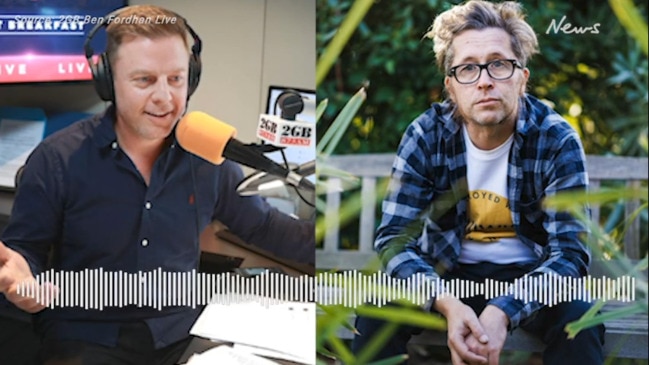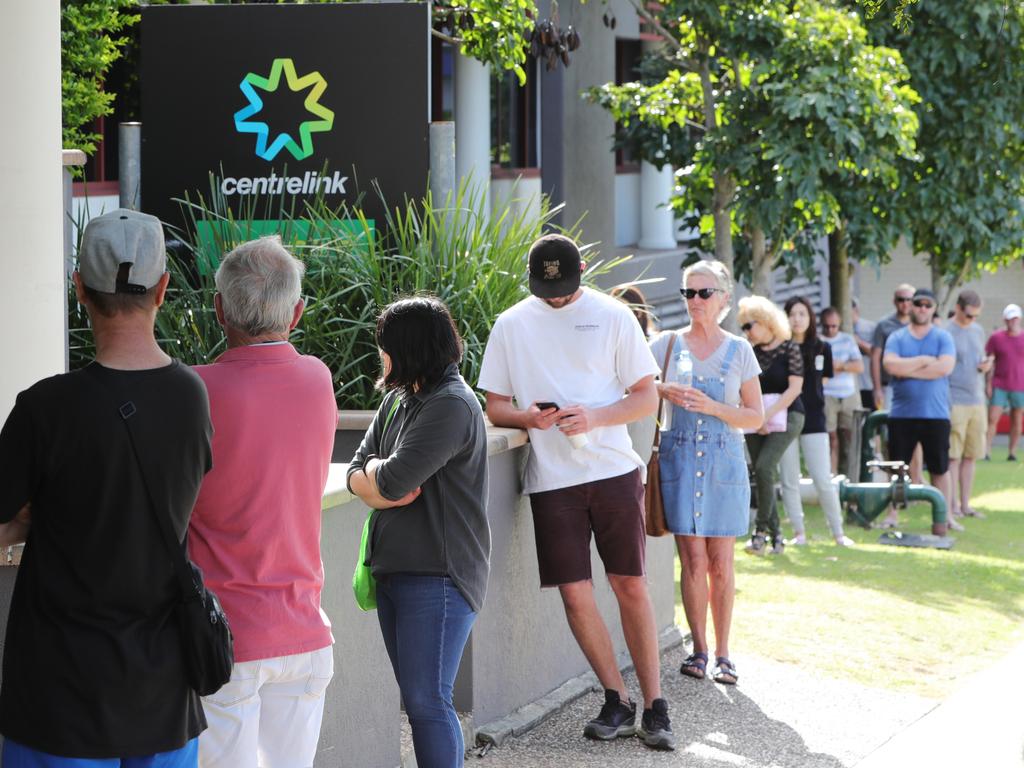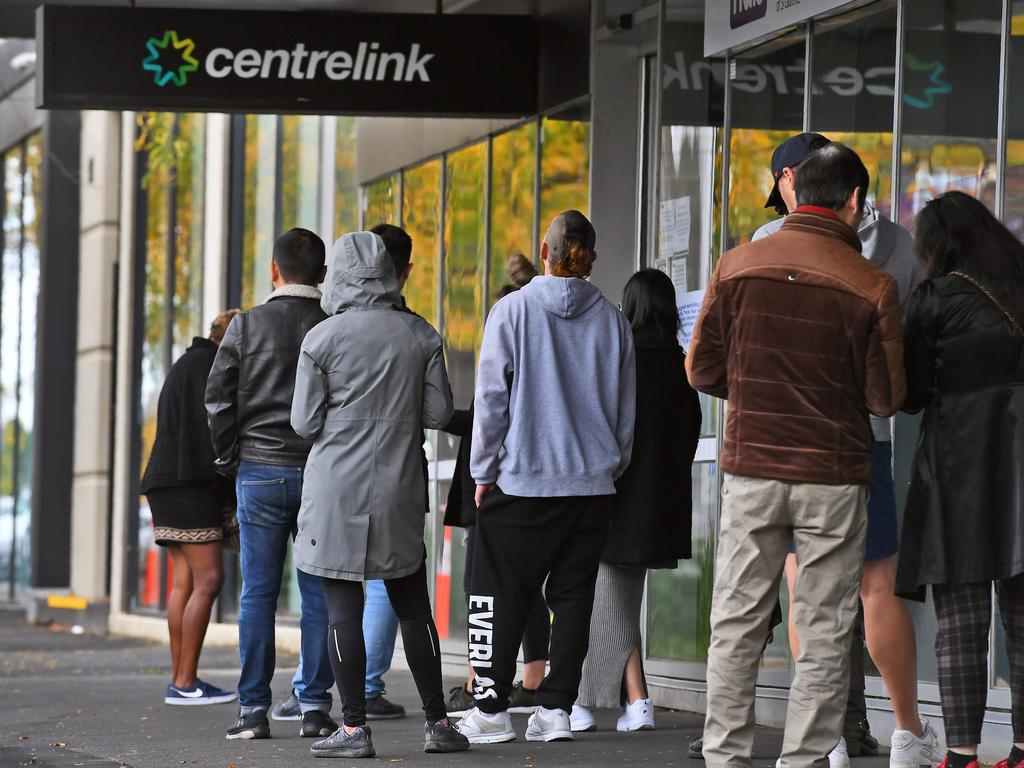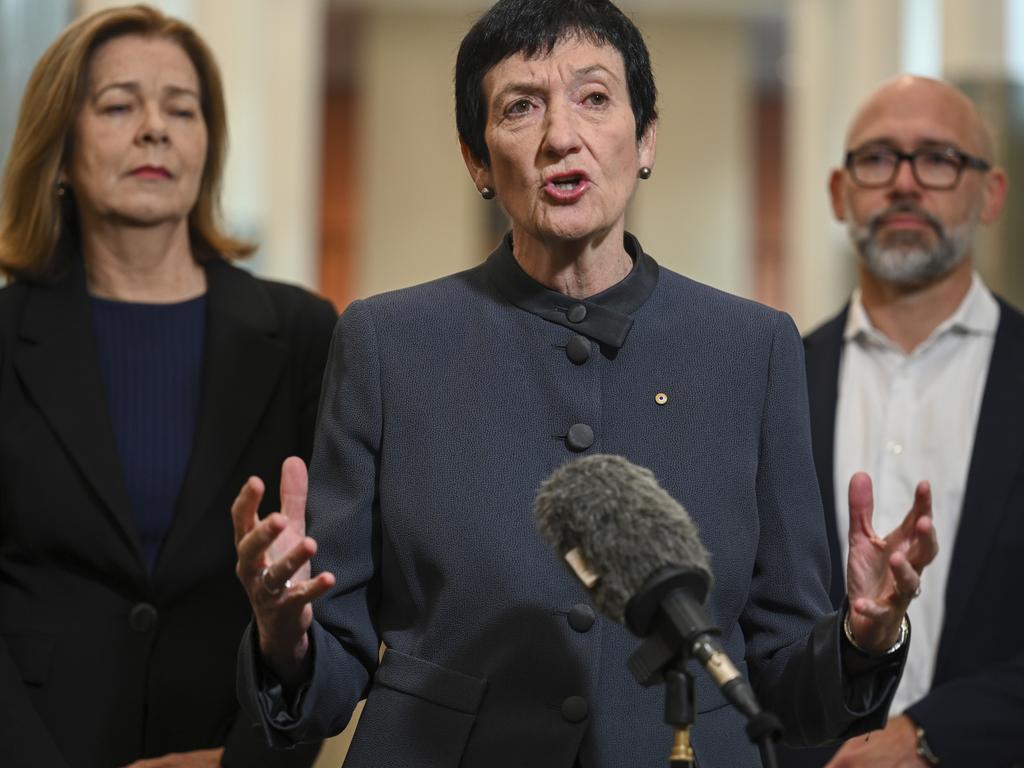‘Economic system depends on unemployment’: Expert says Jobseeker should be tripled to $1132.10 per week
Social justice advocates have hit back at the “bullying” of unemployed Melburnian Jez Heywood, while revealing the ideal rate of Jobseeker.

Social justice advocates have hit back at Ben Fordham over his stoush with unemployed Melburnian Jez Heywood, accusing the 2GB host of “bullying” and “scapegoating” the less fortunate.
Fordham last week told the 47-year-old to “get a job”, after the graphic designer’s comments to The Australian unhappy about the $20-a-week Jobseeker increase went viral.
A public war of words ensued before Fordham invited Mr Heywood on his radio program on Wednesday morning saying he wanted to “find Jez a job”, with the pair clashing on air.
Despite Fordham later saying he had been inundated with job offers, Mr Heywood dismissed the interview as a “cheap publicity stunt” and refused to appear again on Thursday.
On Twitter, a number of users agreed with Mr Heywood’s stance.
“If only Fordham spent this much time, energy and focus on the multinationals and corporates and billionaires that pay little to no tax despite billions in profits,” wrote social justice advocate Kerry Anne.
“This is the nastiest and laziest kind of bullying possible, the media need to do better.”
Another user agreed, “It’s bad enough to zero in on and hassle one person — but every other welfare recipient has to watch as the media vilifies them all and whips up community contempt.”

Dr Blair Williams, a lecturer in Australian politics at Monash University, told news.com.au it was an “an age-old tactic of the culture war of blaming those who are most vulnerable in our society for these issues that are actually systemic”.
“It diverts our attention from the other things that are happening — let’s attack the poor instead of focusing on the billion-dollar corporations that are not paying tax, literally stealing from Australians,” she said.
“Often the ‘dole bludger’ is the scapegoat.”
Dr Williams said the “massive problem is that a lot of people on Jobseeker can’t work because they’re disabled and they’re sick but they can’t access the Disability Support Pension because they don’t qualify, because the requirements have been getting stricter and stricter over the last decade or so”.
“You seen a lot of stories come out over the years of people with terminal cancer who don’t qualify for the DSP,” she added.
Figures from the Department of Social Services in June last year showed 43 per cent of those on Jobseeker, or 358,000 people, had a partial capacity to work, meaning 15 to 30 hours per week.
That figure was up from 25 per cent in 2014.
Of the 358,000, 41 per cent, or 150,000, had a mental health condition and 31 per cent, or 111,000, had a musculoskeletal or connective tissue condition.
Dr Williams said those people should be allowed the flexibility to “work sometimes” but instead were “essentially being forced to look for jobs they can’t do”.
On Thursday, Chris Lucas, owner of high-end restaurants including Chin Chin, said he had nearly 200 positions vacant in Melbourne and Sydney and he was “struggling” to find workers.
“We’ve got plenty of opportunities for anyone who wants to pull their finger out and get on with life and get a real job,” Mr Lucas told Fordham.

But Dr Williams pointed out that “not everyone can work in a restaurant”, which was a taxing industry that often did not pay well and had been plagued with wage theft issues.
“People looking for jobs might be looking for jobs they can physically and mentally do,” she said.
She added that the common refrain that welfare recipients should go and pick fruit “completely overlooks the fact that not everyone is mobile”.
“People have community ties, they can’t just up and leave for something that’s seasonal,” she said.
“Fruit picking is not forever, and not everyone can move to the regions — moving home is expensive, let alone uprooting yourself from community, family, kids.”
The government had been under pressure to increase the Jobseeker payment from $49.50 a day to around $1000 a fortnight, or about $68 a day — 90 per cent of the Age Pension.
Labor said the $24 billion cost to the budget was something it couldn’t afford, but agreed to a much smaller across-the-board increase of $2.85 a day, or about $20 a week.
Dr Williams argued that all payments, including Jobseeker, Youth Allowance and the DSP, should be raised to “well above the Henderson Poverty Line”.
The benchmark, calculated quarterly since 1973 by the University of Melbourne’s Institute of Applied Economic and Social Research, represents the “disposable income required to support the basic needs of a family of two adults and two dependent children”.
The most recent publication for the December 2022 quarter put the figure at $1132.10 per week.
That would work out to more than three times the current rate of Jobseeker — but only about 60 per cent of average weekly earnings.

“What’s really annoying [about the welfare debate] is it literally ignores the fact that our economic system is dependent on about 5 per cent unemployment,” Dr Williams said.
“If it gets higher or lower there are fears of inflation. We depend on unemployment, so whoever’s on it needs to be on a liveable income — not only because it’s important that humans don’t starve, but also it helps them get a job.”
Business Council of Australia (BCA) chief executive Jennifer Westacott, speaking to ABC Radio last week, also welcomed the increase to Jobseeker but questioned what the government was doing to get long-term dole recipients into work.
“You’ve got to fix this system because it’s not working,” she told RN Breakfast.
“There are nearly 40,000 people on Jobseeker who have been on it for 10 years. That tells you the system is not working, something is wrong there. We need to invest in skills, we need to get people that are targeted for jobs that they can get. We need to stop sending people to jobs that they have no chance of getting.”
Ms Westacott said the budget’s foundation skills package should be targeted to “very disadvantaged job seekers” or people who had been on welfare for a long time.
“Over time, we need to get Jobseeker at 90 per cent of the Age Pension, which I think we all agree on,” she said.
“We’ve got to do that in a staged way timed with proper reforms to the way the job services system works. For example, why are we giving providers payments after someone has just been in a job for four weeks when they should be in a job for 26 weeks and it shows that they’ll be in the job for longer? Why aren’t we giving long-term unemployed people a training guarantee so they can upgrade their digital skills and get into the workforce?”

Appearing on the same program, Australian Council of Trade Unions (ACTU) president Michele O’Neil said “more needs to be done to lift people out of poverty”.
“Because one of the things with that payment being so low, is that you don’t have the money to be able to pay rent, you don’t have secure housing, you’re missing meals, you can’t get the data on your phone to be able to look for a job, you can’t pay for the transport to go to job interviews,” she said.
Asked whether the extra $40 a fortnight made those things more achievable, Ms Wood said it was “a start, but it’s not enough”.
Labor MP Julian Hill, chair of parliament’s Select Committee on Workforce Australia Employment Services, said in a statement on Tuesday that it was “a myth that all unemployed people are ready to work or able to do the jobs available”.
“In fact, the data shows a giant mismatch between what employers are seeking and the enormously complex caseload of unemployed people including skills gaps, disabilities and illness,” he said.
“There is strong evidence that the current system has failed to invest in people and is not adapted to their diverse needs, backgrounds, and circumstances. Trotting out stereotypes of ‘dole bludgers’ who should just ‘get a job’ will get a headline but won’t actually change anything. Long-term unemployment won’t be reduced without understanding the actual experiences of people.”
Data released on Thursday by the Australian Bureau of Statistics showed Australia’s unemployment rate jumped from 3.5 per cent to 3.7 per cent in April, as the country shed 27,100 full-time jobs.
“The small fall in employment followed an average monthly increase of around 39,000 people during the first quarter of this year,” said ABS head of labour statistics Bjorn Jarvis.






